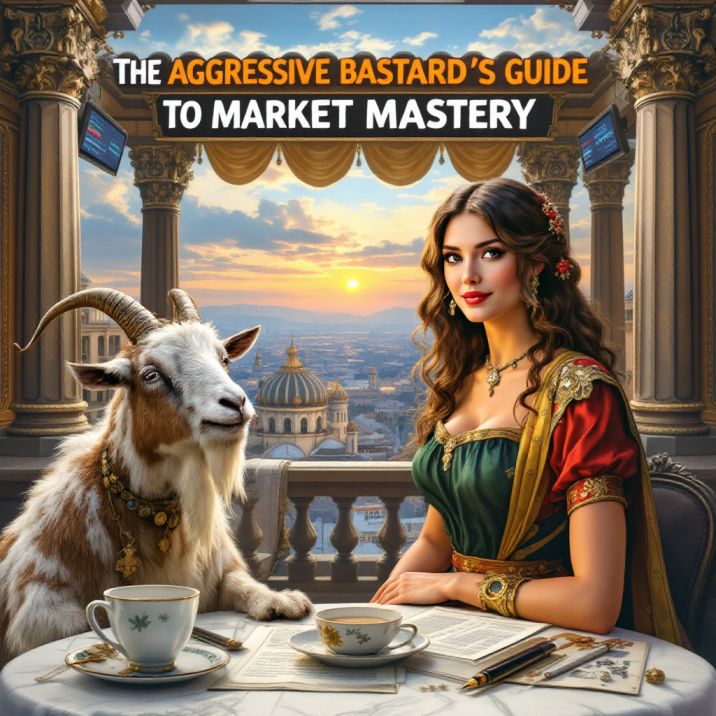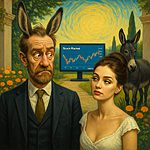
Stock Market Anxiety: Don’t Be a Silly Goat—Seize the Opportunity
Nov 22, 2024
The Bastard’s Guide to Market Mastery: A Contrarian’s Manifesto
- “When Blood Runs in the Streets, Dance with the Devils” Did you know that during the 2008 financial crisis, while most investors fled in terror, David Tepper bought $7 billion by buying financial stocks when everyone thought they would collapse? He famously said, “The worse things get, the better they get. When things are bad, they go up”
. Most market participants behave like frightened sheep, running away precisely when they should be charging forward. J.P. Morgan understood this perfectly when he declared, “In bear markets, stocks return to their rightful owners.”
The masses, driven by their lizard brains, consistently make the same fundamental error: they flee when prices are low and chase when prices are high. Consider this paradox: When your favourite store announces a 50% off sale, you rush to buy. Yet you run away screaming when the market offers the same discount on excellent businesses. As Stanley Druckenmiller noted, “When a dress is on sale, you want to buy, but people’s behaviour is the opposite in the stock market; you want to buy higher and sell lower. You need to fight that emotion.”
2. “The Art of War in Bear Markets”
Sun Tzu’s wisdom transcends battlefields: “Amid chaos, there is always opportunity.”
This ancient insight perfectly captures the essence of market psychology. When markets plunge, most investors become paralyzed by fear, forgetting that volatility is the price of admission for superior returns. Think about this: “Cash combined with courage in a crisis is priceless,” as Warren Buffett observed
The key is not superior intelligence or complex analysis – it’s the emotional fortitude to act when others are paralyzed by fear. The market’s greatest opportunities arise precisely when most people have given up hope. Peter Lynch crystallized this truth: “The key to making money in stocks is not to get scared out of them.”
Yet most investors do exactly that, surrendering their positions at the worst possible moment, driven by the primitive fight-or-flight response that served our ancestors well but sabotaged our investing success.
3. The Madness of Crowds: Your Edge in Chaos
Charles Mackay, author of “Extraordinary Popular Delusions and the Madness of Crowds,” would instantly recognize today’s market behaviour. As social media amplifies both euphoria and panic, the modern investor faces an unprecedented opportunity to profit from mass hysteria.
Consider this statistic: 90% of traders lose money. Why? Because they follow the crowd. George Soros’s reflexivity theory explains this perfectly: “Markets are constantly in a state of uncertainty and flux, and money is made by discounting the obvious and betting on the unexpected.” The key is recognising that market prices often create their fundamental reality through feedback loops.
When Reddit forums scream “buy” and CNBC anchors predict doom, remember Bernard Baruch’s wisdom: “The main purpose of the stock market is to make fools of as many men as possible.” Your edge lies in recognizing these moments of maximum foolishness.
4. The Bastard’s Arsenal: Weapons of Mass Profit
Jesse Livermore, the original trading maverick, said, “There is nothing new in Wall Street. There can’t be because speculation is as old as the hills. Whatever happens in the stock market today has happened before and will happen again.”
Here’s your contrarian toolkit:
– When fear metrics (VIX) spike above 30, start buying systematically
– Create a “panic shopping list” of quality stocks you’ll buy when others flee
– Set alerts for stocks hitting 52-week lows during market-wide selloffs
– Monitor insider buying during periods of extreme pessimism
Howard Marks captured this perfectly: “Move forward when others retreat, retreat when others move forward.” This isn’t just clever wordplay – it’s the essence of successful contrarian investing.
5. The Psychology of the Kill
Daniel Kahneman’s research on loss aversion shows that losses hurt roughly twice as much as gains feel good. This evolutionary quirk creates systematic market inefficiencies that can be exploited.
Consider the 2020 COVID crash: While amateur investors panic-sold their entire portfolios, Renaissance Technologies quietly accumulated positions. As Ray Dalio notes, “Pain plus reflection equals progress.” Each market crash is an opportunity to strengthen your psychological armour.
The key psychological edge? Understanding that most market participants operate on emotion rather than logic. When headlines scream “Market Crash!” that’s usually the best time to buy. As Nathan Rothschild allegedly said, “Buy when there’s blood in the streets, even if the blood is your own.”
6. “The Final Paradox: Embrace Uncertainty”
Here’s the ultimate market truth: The more uncertain things seem, the more certain future returns become. Paul Tudor Jones puts it perfectly: “The secret to being successful from a trading perspective is to have an indefatigable and undying and unquenchable thirst for information and knowledge.”
Actionable steps for the modern bastard investor:
- Create a “fear fund” – cash reserved specifically for market panics
- Develop your “conviction calculator” – a personal metric for measuring market extremes
- Build a contrarian network – surround yourself with level-headed investors who can check your emotions
- Keep a market diary – document your emotional states during extremes
Remember Michel de Montaigne’s wisdom: “The most certain sign of wisdom is cheerfulness.” When markets are in turmoil, maintain your sense of humour – it’s your best defence against the emotional contagion that infects most investors.
Final Thoughts: The Bastard’s Edge
The market’s greatest irony? Most investors know these principles intellectually but fail to apply them emotionally. Your edge isn’t in better information – it’s in better behaviour. As Mark Cuban bluntly states, “Everyone’s a genius in a bull market.”
The true bastard investor knows that fortunes are made not by predicting the future but by preparing for others’ predictable behaviour. When the masses panic, you pounce. When they celebrate, you prepare. This isn’t just contrarian thinking – it’s the essence of market mastery.
Remember: The market doesn’t care about your feelings, theories, or politics. It cares only about supply and demand, fear and greed. Master these forces, and you master the market.
Now, go forth and profit from the predictable panic of others. As the ancient Rothschild banking dynasty knew: “The time to buy is when there’s blood in the streets.” Just make sure it’s not your blood.















